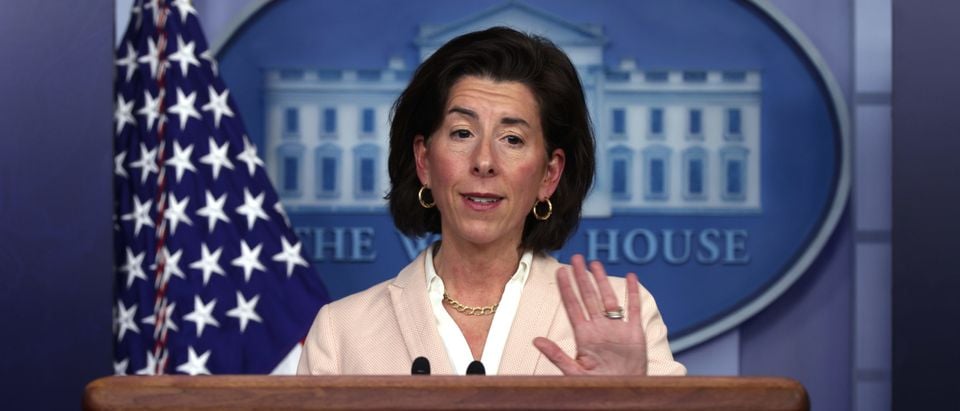President Biden has a China problem, and it’s coming from the top. U.S. Secretary of Commerce Gina Raimondo has spent much of her tenure cozying up to Chinese companies, including Chinese telecom giant Huawei. This problematic relationship is emblematic of this administration’s failure — and particularly Raimondo’s failure — to prioritize the American economic and national security interests that should be at the core of the Commerce Department’s mission.
Prior to Raimondo’s appointment last year, the Commerce Department found that Huawei engaged in “activities that are contrary to U.S. national security or foreign policy interests” and that its affiliates “pose a significant risk of involvement in activities contrary to the national security of the United States.” Specifically, the Department referred to Huawei providing financial services to Iran.
Huawei has also been closely linked with the Chinese government’s efforts to surveil and identify Muslim Uyghurs, who have been targeted for mass detention and sterilization in what human rights groups describe as an ongoing genocide.
For its dealings with Iran, the Department added Huawei to its so-called “Entity List” of foreign individuals and corporations subject to trade restrictions, which are intended to block Huawei from access to important American technological innovations, including advanced semiconductors.
But during her confirmation hearing, Raimondo refused to commit to keeping Huawei on the Entity List, inviting Huawei lobbyists to continue looking for ways around the policy.
Earlier this year, reports surfaced that another Chinese company, Semiconductor Manufacturing International Corporation (SMIC), would be partnering with Huawei to build a $10 billion semiconductor manufacturing plant. Reportedly, the Biden Administration considered tighter restrictions on SMIC, but the Commerce Department allegedly stood in the way of those efforts.
Raimondo has also refused calls to add an offshoot company of Huawei, Honor Device Co., to the Entity List. Honor Device Co. focuses on smartphones, and critics allege that it was spun off for the specific reason of creating a loophole to avoid the trade restrictions with Huawei.
“By spinning off Honor, the [Chinese Communist Party] has so far guaranteed continued access to critical American technology required to ensure one of its companies can continue to produce smartphones – right as Huawei itself has otherwise begun to feel severe market consequences of a successful American export control regime leveled against it,” stated a letter to Raimondo from Republican Florida Sen. Marco Rubio and signed by additional senators. “In other words, just as one of the PRC’s preeminent national champions has begun to suffer from the repercussions of its actions, Beijing has intervened to ensure that some portion of it, in the form of Honor, remains financially viable.”
Egregiously, the Commerce Department has even failed to stop unlawful shipments to Huawei in violation of the trade restrictions in place, which led to an investigative report and a rebuke issued by the Republican members of the Senate Commerce Committee. And under Raimondo’s leadership, the Department approved license applications for Huawei to buy hundreds of millions of dollars worth of chips for use in automobile sensors and screens.
It gets even swampier. We now know from newly released calendar records that Raimondo held a 30-minute phone call with Mickey Kantor during her first month in office. Kantor, a former U.S. Trade Representative and Secretary of Commerce in the Clinton Administration, has held a paid position on Huawei’s North American advisory board for at least a decade. He has also defended Huawei against U.S. scrutiny, including in an interview with a Chinese Communist Party-owned paper.
More broadly, Kantor has been reported as one of China’s top allies on trade issues in Washington, calling security risks posed by Chinese companies including Huawei “vastly overwritten and overstated.” He has also called for a “peaceful duopoly” with China and has criticized American visa restrictions on Chinese businesses.
Unlike many others listed in the calendar, Kantor is listed solely by name without accompanying identification of his former public or private sector roles. Based on the Department’s soft line toward Huawei, Raimondo owes the American people an explanation as to what was discussed and what her ongoing conversations related to Huawei have entailed.
The stakes are high and the risks are clear. Raimondo needs to answer her critics’ concerns about Huawei, and she needs to address her Department’s weak approach on China.
Jon Schweppe is the policy director at American Principles Project. He is the founder of BigTechFunding.org and a co-author of a groundbreaking report detailing Big Tech’s outsized impact: “Big Tech vs. Democracy.” Follow him on Twitter: @JonSchweppe.


